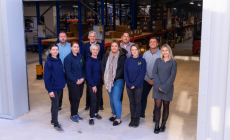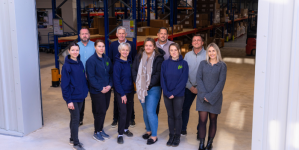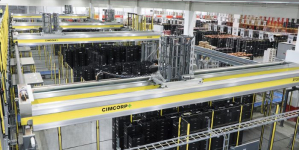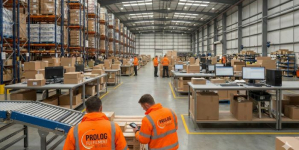-
Nulogy Introduces the Manufacturing Operating System - February 27, 2026
-
Bliss Direct scales to 300 daily orders and saves 25 hours per week with Forterro’s Orderwise ERP - February 25, 2026
-
Wootzwork raises $6.6M to bring predictability to offshore manufacturing - February 25, 2026
-
Rite-Hite unveils new range of hydraulic kits to upgrade and extend dock leveller performance - February 19, 2026
-
REWE and Cimcorp automate fresh supply chain for Berlin supermarkets and stores - February 19, 2026
-
Q1 – A recovery period or time to fix, switch and scale? - February 19, 2026
-
NULOGY’S SHOP FLOOR SOFTWARE TO POWER COMPLETE CO-PACKING’SOPERATIONS - February 13, 2026
-
Why lead generation depends upon good content - February 13, 2026
-
Wallapop and Albatross Sign Strategic Partnership to Bring Real-Time AI Discovery to the Future of Consumer-to-Consumer Commerce - February 12, 2026
-
Thorworld ramp helps Hubergroup to streamline its unloading operation - February 6, 2026
Ivanti Study Finds that Over Half of Warehousing and Supply Chain Organizations Plan to Upgrade their Fleet of Mobile Devices.
Study, Conducted by VDC Research, Demonstrates the Speeding Adoption of Modern Mobility Solutions and How They Drive Productivity and Efficiency Gains
Ivanti have announced findings of a new research study, “Taking Advantage of Apps and App Modernization in Warehousing.” Based on research conducted by VDC Research, the study addresses the evolution of mobility in warehousing and outlines evolving requirements shaping the future of mobile applications within the supply chain. Research findings cover the issues and barriers associated with implementing modern mobile devices and applications to support warehouse operations.
“The warehouse is much more complex than it was 10 years ago,” said Steve Bemis, Global Vice President of Sales, Supply Chain Business Unit, Ivanti. “Now, so many factors can impact the success of supply chain operations. Everything from asset utilization to working capital to transportation expenses, and even regulatory pressures, employee turnover and the need for faster response times, are driving companies to look for new ways for improving productivity. Along the way, they are also finding that stepping up to ‘modern mobility’ with Android gives them an edge.”
Key findings from the VDC Research study include:
· 53 percent of IT decision makers supporting warehouse operations view their mobility deployments as immature.
· 56 percent of organizations plan to upgrade their existing fleet of mobile devices as their current devices near end-of-life.
· One in four respondents cited a more visual and modern user interface as a critical factor influencing the decision to upgrade
“A critical component of today’s digital transformation strategies is migrating legacy mobile applications running on aging equipment to take advantage of more sophisticated and functional modern mobile solutions and their intuitive interfaces,” said David Krebs, Executive Vice President, VDC Research. “Warehouse and DC operations executives are facing immense pressures to operate even more efficiently, reducing errors and fulfilling orders faster. The transition to modern mobile solutions addresses not only their mobile device performance, functionality and fit requirements but also offers an opportunity to rethink workflows and further refine workflows.”
Top take-aways outlined in the VDC Research study include:
End-of-Life for Legacy OS Presents Challenges for Warehousing Operations. Ruggedized handheld computers have long been the de facto platform for data collection and processing within the warehousing industry. Used for inventory management, package delivery verification, digital exchange and other applications, many organizations rely on mobile devices to conduct business critical operations in real-time. However, with the dominant mobile operating systems – Microsoft Windows Mobile, Windows CE and Windows Embedded Handheld – nearing end-of-life, many current customers have been left with no clear migration path to new technologies. Further, most organizations don’t have the resources or time to dedicate to the transition process.
Industrial Browsers Can Ease Transition to Modern Mobile Platforms. As organizations anticipate and plan for Windows Embedded CE and Windows Embedded Handheld OS end-of-life, industrial browsers can help to pave the way for a smooth migration to modern mobile platforms, including Android-based solutions. Not only do they eliminate the time and costs associated with re-writing legacy applications, these browsers will automatically convert a host application’s text interface so it delivers the modern touchscreen experience users want and expect from their devices.
Modern Mobility Can Drive Speed and Agility. Regardless of which OS warehousing and supply chains choose to leverage, the deployment of handhelds, wearables, and other mobile devices has been shown to deliver significant productivity gains while providing new opportunities for gaining agility and speed, especially among the growing population of younger workers. However, as part of its study, VDC Research found that many organizations are also continuing to rely heavily on computer terminals with batch connectivity and legacy software to manage their operations. Through the deployment of modern mobile solutions, warehouse professionals will find it easier to migrate away from manual processes and paper-based tracking and to a more technology-driven approach. This leads to improved utilization of available resources, greater efficiencies in inbound and outbound handling, storage, inventory control, “pick and fill” and other critical operations.
The VDC Research study was fielded in August 2017 and includes a mix of respondents from North America and Europe across multiple industries. To download the research report, “Taking Advantage of Apps and App Modernization in Warehousing,” visit https://go.ivanti.com/Email-VDC-Mobile-Trends-Report.html.

































